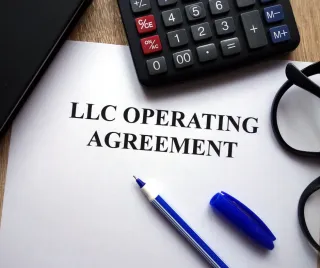How We Can Help You

Top-Notch Liability Protection
Setting up an LLC for your business or real estate investment protects your personal assets from any business debts or liabilities. This means your home, car, and savings are safe in case of a lawsuit or bankruptcy.
Services Offered
Business decisions made easy. Personalized LLC support for the win!

Full Service LLC Set Up
- Name check for availability with the State. We help with selecting a unique and distinguishable name for your LLC that complies with state naming requirements. The name must include "Limited Liability Company" or an abbreviation of "LLC" at the end.
- Preparation and Filing of Articles of Organization or Certificate of Organization. We prepare and file the Articles or Certificate of Organization with the appropriate state agency, usually the Division of Corporations or Secretary of State's office. This document officially creates the LLC and includes basic information such as the business name, address, registered agent, and purpose of the LLC.
- Designate a Registered Agent. We appoint a registered agent who is responsible for receiving legal documents and official correspondence on behalf of the LLC. The registered agent must have a physical address in the state where the LLC is formed. Liability Lessons offers registered agent services in the event an owner would like anonymity, would like someone else to have the responsibility of ensuring renewal each year and/or receiving correspondence and/or service of process on behalf of the LLC.
- Preparation of an Operating Agreement. We prepare the Operating Agreement for the company which outlines the ownership structure, management roles, decision-making processes, and other key provisions of the LLC.
- Obtain an Employer Identification Number (EIN). We apply for an Employer Identification Number (EIN) from the Internal Revenue Service (IRS). An EIN is required for tax purposes, opening a business bank account, and hiring employees (if applicable).
- Guidance on State and local compliance requirements. We can assist with guidance on state and local government compliance requirements that may be specific to your type of business, such as additional registration or licensing.
- Tips on how to Operate your LLC. Once your LLC has been set up, we advise you on "next steps" to take, such as opening a business bank account, receiving payments in the name of the LLC, and keeping your LLC compliant. Operating your LLC correctly is essential to ensure compliance with legal requirements, protect your personal assets, and maintain the integrity of your business.

LLC Review
We provide free reviews of existing LLC documents to help identify any potential issues or discrepancies in the formation documents, operating agreement, tax filings, or other important documents related to the LLC and can help to rectify any deficiencies.


Registered Agent Services
We offer Registered Agent Services for LLC domiciled in the State of Utah. These services include designating us as the Registered Agent for the LLC, meaning we would receive legal documents, official correspondence, and service of process on behalf of the LLC. Here is an overview of what registered agent services entail:
1. Legal compliance: A registered agent ensures that a business entity remains in compliance with state regulations by maintaining a physical address within the state where the entity is registered to do business. The registered agent is responsible for receiving important legal and tax documents on behalf of the business and forwarding them to the appropriate individuals within the organization.
2. Service of process: A registered agent accepts service of process, which includes legal notices, lawsuits, and other official documents that are served to the business entity. The registered agent receives these documents on behalf of the business and ensures that they are handled promptly and appropriately according to legal requirements.
3. Privacy protection: Using a registered agent service can help maintain the privacy and confidentiality of the business owners and managers, as the registered agent's address is listed publicly instead of the owners' personal addresses. This can help protect the owners' personal information from being publicly disclosed in connection with legal matters.
4. Business continuity: Having a registered agent in place ensures that important documents and notices are received and handled even if the business owners or officers are unavailable or have changed addresses. This helps maintain business continuity and ensures that the business remains informed of any legal or regulatory requirements.
5. Compliance monitoring: Registered agent services often include monitoring important filing deadlines, such as annual report filings, and ensuring that the business entity remains in good standing with the state. The registered agent may provide reminders and assistance with filing necessary documentation to maintain compliance.
Overall, registered agent services play a crucial role in ensuring that a business entity meets legal requirements, receives important documents in a timely manner, and maintains privacy and compliance. It is important for businesses to appoint a reliable and reputable registered agent to fulfill these responsibilities effectively.

Property Transfer Services
In the event your LLC was created to hold real property, such as a rental property, investment property, AirBnB/Vrbo, etc., we can assist to transfer the title of the property into the name of the LLC. Here are some of the key benefits of ensuring that your property is properly titled in the name of the LLC:
1. Limited liability protection: By titling property in an LLC, the owners of the LLC can protect their personal assets from potential liabilities associated with the property. In the event of a lawsuit or financial claim against the property, only the assets owned by the LLC are at risk, shielding the personal assets of the individual owners.
2. Asset protection: Titling property in an LLC can help safeguard the property from creditors or legal claims against the individual owners. This separation between personal and business assets can provide an additional layer of protection for the property and reduce the risk of personal financial loss.
3. Tax advantages: Holding property in an LLC can offer tax advantages, such as the ability to pass through income and losses to the individual owners for tax purposes. This can potentially result in tax savings and more flexibility in managing tax liabilities related to the property.
4. Estate planning and succession: Titling property in an LLC can facilitate estate planning and succession purposes by allowing for the smooth transfer of ownership interests in the property to heirs or beneficiaries. The ownership structure and provisions outlined in the LLC operating agreement can help ensure a clear and efficient transition of the property in the event of the owner's death or incapacity.
5. Business structure and management: For individuals who own multiple properties or operate a real estate investment business, titling property in an LLC can help streamline management, organization, and administration of the properties. The LLC framework provides a formal structure for managing the property, making decisions, and handling financial matters.
6. Privacy and anonymity: Titling property in an LLC can offer privacy and anonymity for the individual owners, as the ownership of the property is associated with the LLC rather than the individual's name. This can help protect the owners' personal information and provide a level of confidentiality in real estate transactions.
Overall, titling property in an LLC can offer liability protection, asset protection, tax advantages, estate planning benefits, and organizational advantages for real estate owners and investors.


Operating Agreement Creation
Many LLCs, especially ones that were created by the owner themselves, do not have an Operating Agreement. An Operating Agreement is a crucial document for an LLC as it outlines the ownership structure, management responsibilities, decision-making processes, and other key provisions of the business. Here are some reasons why an Operating Agreement is important for an LLC:
1. Clarifies ownership and management: The Operating Agreement specifies the ownership interests of the members, their contributions to the business, and their rights and responsibilities. It also outlines the roles and responsibilities of managers or managing members, if applicable, and establishes the decision-making process within the LLC.
2. Protects limited liability status: Having an Operating Agreement in place helps reinforce the separation between the business and the personal assets of the members. This is important for maintaining the limited liability protection that an LLC offers, as it demonstrates that the business is being operated as a separate legal entity.
3. Prevents disputes and misunderstandings: By clearly defining the rights and obligations of the members in the Operating Agreement, potential conflicts and misunderstandings can be minimized. The Operating Agreement can address issues such as profit sharing, decision-making authority, ownership transfers, and dispute resolution mechanisms.
4. Customizes the business structure: The Operating Agreement allows the members to tailor the structure and operations of the LLC to suit their specific needs and preferences. It provides flexibility in setting up governance rules, distribution of profits and losses, management structure, and other important aspects of the business.
5. Provides legal protection: In the absence of an Operating Agreement, an LLC may be subject to default rules and regulations imposed by state laws, which may not align with the members' intentions. Having a comprehensive Operating Agreement in place can help protect the interests of the members and provide a framework for resolving legal disputes.
6. Enhances credibility and professionalism: A well-drafted Operating Agreement can enhance the credibility and professionalism of the LLC in the eyes of stakeholders, including investors, partners, and financial institutions. It demonstrates that the business is well-organized, structured, and prepared for effective operation.
Overall, an Operating Agreement is a foundational document for an LLC that helps establish clear guidelines for ownership, management, and operation of the business. It is essential for protecting the interests of the members, maintaining compliance with legal requirements, and promoting the long-term success of the LLC.

Testimonials



Alex Coombs

Alisha was so great to work with! She is fast, efficient and got my companies reports done in no time! She really knows her stuff and I would 10/10 recommend her to anyone looking for her services!



Cassie Boone

Absolutely loved working with Alisha! She is so kind and easy to work with. I had a million questions and she was happy to go over everything. She also gave great suggestions how to grow my business. 100% recommend!



Anna Salvania

Alisha made creating my LLC such a breeze!! I am so grateful for her attention to detail and communication throughout the process. Would absolutely trust her to do it again for me and will recommend her to all fellow photographers that need to create their LLC as well!
Frequently Asked Questions
The More You Know...
Why do I need an LLC?
1. Limited Liability Protection: As an LLC, your personal assets are protected from any business debts or liabilities. This means your home, car, and savings are safe in case of a lawsuit or bankruptcy.
2. Tax Benefits: LLCs offer flexibility in how you are taxed, allowing you to choose between being taxed as a sole proprietorship, partnership, S-corp, or C-corp. This can help you save money on taxes and maximize your profits.
3. Credibility: Operating as an LLC can add legitimacy and credibility to your business. It shows potential clients and partners that you are serious about your venture and are committed to following legal and ethical business practices.
4. Easy Management: LLCs have less paperwork and formalities compared to other business structures like corporations. This makes it easier to set up and manage your business without the burden of complex administrative tasks.
5. Growth Opportunities: Setting up as an LLC can make it easier to attract investors and raise capital for your business. It also allows for easy transfer of ownership, making it simpler to bring on new partners or sell the business in the future.
Do you offer Registered Agent services?
Yes! We offer Registered Agent services in the State of Utah for $75 per year.
A Registered Agent is a designated individual or company responsible for receiving official correspondence on behalf of the LLC, receiving Service of Process, and ensuring your LLC is renewed with the State each year.
What role does a "Manager" of an LLC hold?
The role of a manager in an LLC typically includes:
- Making key business decisions and strategic plans
- Handling day-to-day operations and management tasks
- Representing the LLC in legal matters and transactions
- Ensuring compliance with state laws and regulations
- Communicating with members and stakeholders
- Overseeing financial matters and budgeting
- Hiring and supervising employees (if applicable)
It's important for managers in an LLC to act in the best interests of the company and its members (owners), and to fulfill their fiduciary duties with care, loyalty, and honesty.
What role does a "Member" of an LLC hold?
A member of an LLC (Limited Liability Company) is an owner in the business. In an LLC, the owners are referred to as "members" rather than shareholders or partners. Members have ownership interests in the company and have a say in the management and decision-making processes, depending on the structure of the LLC.
Members of an LLC typically have rights and responsibilities outlined in the operating agreement, which is a legal document that governs the operations and management of the business.
The operating agreement may specify each member's ownership percentage, voting rights, profit-sharing arrangements, and other key provisions related to the member's role in the company.
It's important for members of an LLC to understand their rights and obligations, as well as to communicate effectively with other members and stakeholders to ensure the smooth operation and success of the business.
